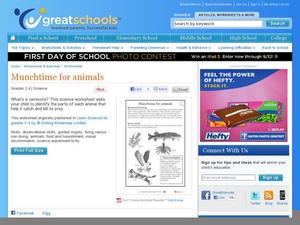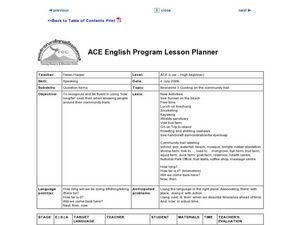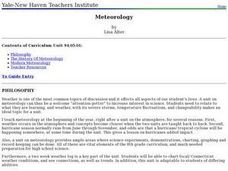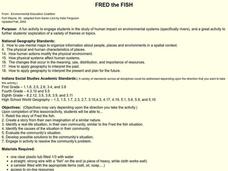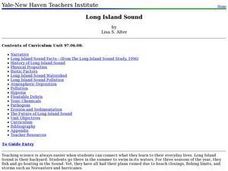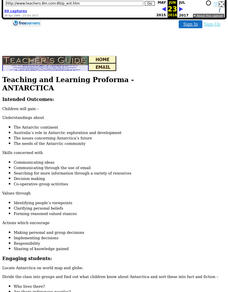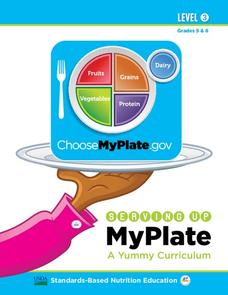Curated OER
Sharing is Caring
By engaging in an arts-based activity, 2nd graders explore peace in the classroom. They listen to the story The Rainbow Fish, then create their own fish to hang in the classroom. They write three things that make them happy on their...
Curated OER
What Does Earth Day Mean? - Biology Teaching Thesis
Students possible sources of water pollution, and explain the effects that water pollution can have on the food on the food chain. They Name human and other animal (i.e. fish) illnesses that can be contracted from drinking polluted...
Curated OER
Exploring Arizona's Biotic Communities Lesson 3: A Day in the Life
Junior ecologists examine Arizona's biotic communities and research an animal or plant that is found in this community. In this instructional activity, learnerss write a narrative essay about their assigned animal or plant. They research...
Curated OER
Munchtime for animals
Which animals eat meat to stay alive? Third graders group fish, hawks, and cats into carnivores and herbivores. An extended activity prompts kids to cut out magazine pictures of different animals according to the foods that they eat.
Curated OER
Itineraries Three: Guiding on the community trail.
Students become familiar with the vocabulary of various trip activities. For this itineraries lesson, students use questioning words such as how long and how far to describe activities on trips. Students practice questions and answers...
Curated OER
Involving Community Members, Parents, and Community Agencies in Student Learning
Students predict and estimate the number of moose shot by people between the years of 1986-1990. They analyze data and statistics, construct bar graphs, and conduct research on the Alaskan moose.
Curated OER
The Rainbow Fish
Students are read a book about friendship. They create a friendship chain out of construction paper. They discover the importance of friends in school.
Curated OER
Examining the Stages in Ecological Succession
For this ecosystems worksheet, students use illustrations and descriptions of four ponds to determine the order of succession. Students complete 8 fill in the blank questions and 5 short answer questions.
Curated OER
Wildlife Conservation III
Discuss the importance of wildlife conservation. Learners talk about the animals and plants on the US Fish and Wildlife Services list of endangered and threatened species. Then, they engage in a detailed discussion of the reasons these...
Curated OER
Biodiversity Debate - Stream Side Science
Role play community members who are both for and against the construction of a dam. Research the pros and cons and then hold a classroom debate. This activity ideally follows a series of stream studies, links to which are included. Use...
Curated OER
Meteorology
Students research and produce an oral history that reflects the importance of meterologists in the lives of people in their community.
Curated OER
FRED the FISH
Young scholars engage in the study of the human impact on environmental systems (specifically rivers). This instructional activity enhances Students' exploration of a variety of themes or topics.
Curated OER
Changes in the Community: Diversity of Learners Adaptation
Young scholars determine the rate of travel through Ohio based on mode of transportation: walking, horse bak riding, railroad, and car. They are asked to write a sentence explaining how they would determine how long each trip takes....
Global Oneness Project
Communities on the Threshold of Change
Viewers of the short documentary Santa Cruz Del Islote consider how changes in climate and overfishing impact the life style of the 1,200 residents of a small island off the coast of Cartagena, Columbia.
Curated OER
A Sense of Place
Learners read "Fish Tale: Falling For a Live One" from The New York Times and discuss the methods and techniques the writer uses to create a strong mental image. Students pick a place in their community they wish to write about and...
Curated OER
Grocery Bag Art
Students develop and promote self expression along with promoting PE program with the community. They decorate grocery bags from a local store with a picture of themselves. Bags are returned to the store to be used.
Curated OER
Respect, Cooperation
First graders listen to the Rainbow Fish and sing the song We Are Crayons and list. In this respect and cooperation lesson, 1st graders answer questions about things that make them special. Students write something that makes them unique...
Curated OER
Partners for the Common Good: One Day
Fourth graders explore the concept of philanthropy. In this service learning lesson, 4th graders compare for profit and nonprofit organizations. Students explore nonprofit organizations in their community and discuss their philanthropic...
Curated OER
Investigative Case: The Nancy Creek Challenge
Students examine a case study of fish kill in Nancy Creek and identify the environmental conditions that favor life in a fresh water ecosystem. They work in small groups to assess the situation and gather resources from various places in...
Curated OER
Gathering, Traditions, and Nutrition of Our Food
Students gain a better understanding of what it means to eat seasonally through learning about traditional hunting, gathering, and food preparation methods of Athabascan tribes. By interacting with Native American Elders and...
Curated OER
Long Island Sound
Students use the Internet to research the history of Long Island Sound. In groups, they identify the sources of point and nonpoint pollution and how humans are impacting the area. After watching a video, they discuss the role of...
Curated OER
Antarctica
Students explore the Antarctic continent, Australia's role in Antarctic exploration and development, the issues concerning Antarctica's future and the needs of the Antarctic community.
Curated OER
Ecosystem Vocabulary
In this ecosystem worksheet, students read descriptions and match the appropriate vocabulary term using ecosystem, habitat, community, and population. Students identify ten vocabulary terms.
US Department of Agriculture
Serving Up My Plate
Within three nutrition-themed, inquiry-based learning opportunities, pupils take notice of their eating habits; delve deep into the five food groups, gain experience in planning meals, participate in a taste test, and explore ads from...





